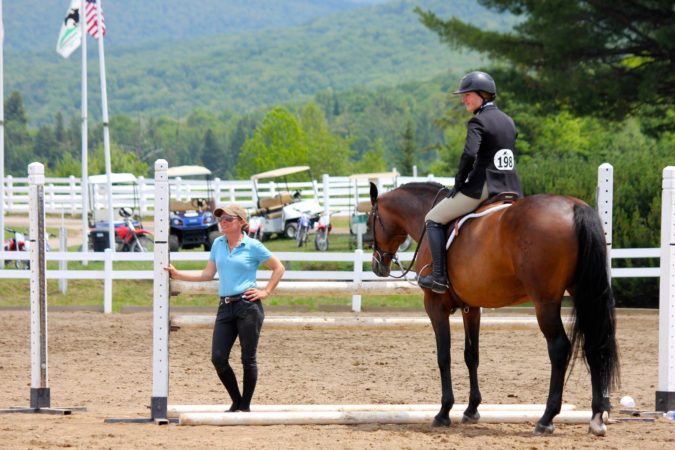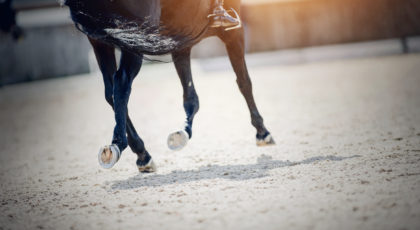Her voice gets louder. “RIGHT leg! Why are you hanging on the inside rein?!” You feel the anxiety begin to build in that familiar part of your gut. Your face is red as a tomato and you’re sweating more than you thought possible. You’re using all of your mental energy to try and operate your right leg, which for some reason, isn’t cooperating today. As an unfortunate result, no mental energy is being used to do the one thousand other things that you’re supposed to be thinking about. “Go forward! That is a four, not a SIX!” Your confusion seems to be intensifying. You’re hot and tired, maybe a little bit nervous. But what’s the real problem here? You really just don’t understand what your trainer is trying to get you to do. At this point, you’ve wasted so much of your energy just trying to keep your stupid butterfingers closed on the reins that hearing the words “Yes! That’s it!” is probably not on the agenda for today.
We’ve all been there. Trying to remember everything at once can be really overwhelming, and sometimes, you just want to go for a nice trail ride. So what should you do when you and your trainer aren’t quite seeing eye to eye?
1. Ask questions.
If you don’t understand something, ASK!!! No one expects you to know everything or understand every explanation. When things get confusing, take a moment and say, “Hey wait a second, I’m not sure I completely know what he/she means,” (it’s truly a novel idea, I know). Whether it’s where you put your legs during a shoulder-in or how to do an automatic release the right way, asking is always better than pretending like you know what’s going on. Most of the time, your trainer can see through this anyway.

2. Listen actively.
When your trainer is explaining something to you, make sure you are paying attention. Take in every word and process the information. If you don’t understand, reference point #1. Make mental notes and make an effort to remember the things they tell you—usually, trainers don’t just spout meaningless information. For example, take a second to think about where you can shorten your reins during your course or what track you need to take to make a bending line work out. Repeat what your trainer says to you back to them if that makes it easier to learn. If they tell you something, you better remember it—when they ask you a year later what they said, you’ll be glad you paid attention.

3. DO NOT talk back.
I mean, this should be something your parents taught you at a very young age, but if you need a reminder—talking back to an authority figure is never a good idea. When your trainer’s job is to give you guidance and help you become a better rider and you decide to have an attitude, it usually doesn’t go over very well. Never mind the fact that it is downright disrespectful and rude. When your trainer says, “Stop pulling on your inside rein!” the answer should not be “I wasn’t.” Instead, simply make an attempt to do what they ask of you. No trainer wants to coach someone who mouths off during lessons.

4. Try not to make the same mistake over and over.
Most people do not enjoy having to repeat themselves time and time again. Of course, everyone makes all kinds of mistakes. But no matter how erroneous they are, make sure to try your best to do it better the next time around. But I guess this is easier said than done. Usually, you’re not trying to repeat the same mistake, and sometimes it doesn’t even feel like you are. Having someone tell you not to do that thing ONE MORE TIME can be very stressful. This is where you need to take a breath and take a step back. Ask your trainer for clarification. Do your best to articulate your confusion without having an attitude, like, “Wow, I’m really struggling with this. Can you talk me through it?” There’s no shame in admitting you’re completely lost. Your trainer can tell when you make a legitimate effort to improve upon your mistakes and they will be pleased to see you put in that effort. If it gets better, you’re doing something right.

5. Have some defined goals.
It is much easier to know what to work on and improve when you are working toward a specific goal or goals. These can be short-term goals, like qualifying for a medal final at the end of the year, or long-term goals, like showing in a Grand Prix by the time you are 35. They can be small or large goals, like remembering to look ahead over the top of a jump or being able to do a movement perfectly on the flat. Defining your ambitions is important for making decisions about a training program for your horse and you. Working toward a specific end gives you a timeline and framework for answering the question, “How do you intend to reach this goal?” This can also give your trainer a better idea of what you need to work on and how intense your training should be.

6. Work hard.
Time and time again, you hear people being praised for their work ethic—and time and time again, this quality is more important than talent. Talent with hard work is a recipe for greatness, but without a work ethic, talent can only go so far. Hard work really does pay off, and your trainer will notice and appreciate the determination. Fully committing to No-stirrups November or going out to the barn early to help muck and feed can really show your trainer that you’re serious. Working hard makes their job easier, and also more fun!

7. Bring your best every day.
Working hard becomes easier the more you bring to the table. If you show up with all the tools you need to thrive, then success is inevitable. Whether this means making sure you get enough sleep or just being on time, any effort you take to make sure you’re on top of your game will be valuable to your learning experience as a whole. It’ll make your trainer’s job that much simpler if you are able to give your all every time you step into their ring.

About the Author
Alex Carlton has been an avid hunter/jumper rider for as long as she can remember. A senior at the University of Vermont, she is a co-captain of their IHSA team. She competes in intercollegiate competitions as well as horse shows up and down the east coast.


 April 25, 2016
April 25, 2016 

























